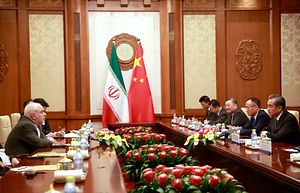Trans-Pacific View author Mercy Kuo regularly engages subject-matter experts, policy practitioners and strategic thinkers across the globe for their diverse insights into the U.S. Asia policy. This conversation with Nicolò Sartori — senior fellow and Head of the Energy, Climate & Resources Programme at the Istituto Affari Internazionali (IAI) in Rome and adjunct professor in Natural Resources and Energy Security at the Master in International Security Studies (MISS) of the University of Trento and professional fellow at the World Energy Council (WEC) — is the 202nd in “The Trans-Pacific View Insight Series.”
Explain Iran’s gains and losses from China’s decision to import Iranian oil despite U.S. oil sanctions.
China is the world’s second largest oil consumer after the U.S. and still one the main drivers of the global energy demand. Keeping the Chinese export market open is fundamental for Iran if the country wants its production/export levels sufficiently high, and also to cope with missing trade with other partners compliant with the U.S. sanctions regime. Those that have more to lose in this situation are Chinese companies which are effectively sanctioned because of their oil trade with Iran (i.e. Zhuhai Zhenrong), while for Iran itself the most relevant hurdle is due to the fact that under these commercial conditions, the price paid by international customers for its oil will be (probably) lower than what they would pay to Tehran without the sanctions regime.
Analyze why Iran is using the Strait of Hormuz to escalate tensions with the U.S. and Europe.
Threatening to escalate tensions in the Strait of Hormuz is one of the options in the hands of Tehran to counterbalance U.S. aggressiveness against the country. Indeed, the Strait crossed daily by tankers transporting up to 20 million barrels of oil, exported not only by Iran, but also by U.S. allies such Saudi Arabia, Kuwait, UEA and Iraq, while the Strait is also the outlet for LNG volumes exported by Qatar. Given the strategic value of Hormuz for global hydrocarbon transit, it is easy to understand how both Western consumers and Gulf producers might be heavily affected by a potential conflict in the area. In any case, it cannot be underestimated the impact of this situation also for China and other big Asian energy consumers: since they currently are the larger importers of oil and gas from the Gulf, they will be among the countries most heavily hit by Iran’s potential aggressiveness in Hormuz.
How are Tehran’s provocations destabilizing relations between Iran and Europe?
As said above, Europe imports oil and gas volumes from the Gulf area and the security and reliability of these flow is considered a strategic priority at the European level. However, due also to flattening domestic energy demand and massive decarbonization policies implemented at the EU level, Europe is not anymore the major hydrocarbon trade partner at the regional level. This does not mean that European governments, companies, and citizens will not be affected by mounting destabilization in the Strait of Hormuz, but that other countries risk to pay significantly more in case of conflict eruption in the area. This is, in particular, the case of China and East Asia economies, increasingly dependent of oil and gas from the Gulf. Moreover, looking specifically at EU-Iran energy relations, it has to be stressed the limited (and decreasing) importance of Iran crude in the overall European oil mix: in 2018, only 3.5% of the total oil imported by EU countries was from Iran, a data point that also demonstrates the small impact of U.S. sanctions on Europe’s energy security.
What are the implications of Iran’s actions on the future of the Joint Comprehensive Plan of Action (JCPOA) for European stakeholders?
Europe invested a lot of its political capital on the JCPOA, and more in general on the (re)inclusion of Iran in the international community. The derailment of the agreement will have huge political implications on the perception of the EU as a global actor vis-à-vis tradition and emerging powers, and in general it will have an impact on the strategic scenario in the Middle East region, an area that Europe considers as its neighborhood and the destabilization of which represents a major security threat for the EU. In terms of energy security, direct risks of further isolation of Iran appear limited (as analyzed above, oil imports in Europe are relatively low and progressively decreasing), while indirect implications of a misaligned Iran include the insecurity of the oil and gas flows from the Gulf region, and more in general the volatility of hydrocarbon prices at the global level.
What is the impact of Beijing’s defiance of U.S. sanctions on China’s relations with Europe and the Middle East?
First and foremost, China’s decision to continue oil imports from Iran despite U.S. sanctions demonstrates the willingness (and the capacity) of Beijing to act as a global power. And being a global power, it wants to demonstrate that its energy security choices should not be determined and imposed by the unilateral decisions of other international players. With the EU distancing itself from the U.S. and Washington’s global policies under Trump administration, the move of China can give hope to the EU to keep Iran somehow part of the international community, an objective which is still among the strategic priorities in Brussels. When it comes to Middle Eastern countries, the choice of Beijing to flirt with Tehran despite the U.S. sanctions is certainly not welcome by the governments of the Gulf. However, the importance of China as energy customer, and more in general as economic, financial and progressively political partners, imposes a balanced and pragmatic approach to their bilateral relations with China.

































